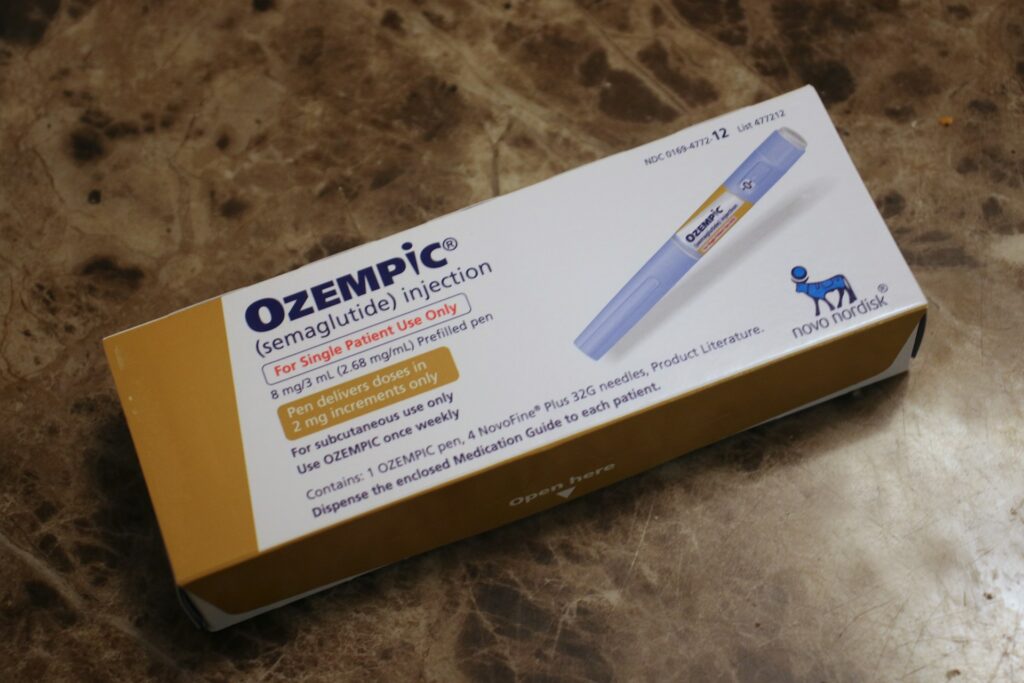Ever since Ozempic exploded in popularity, there have been many claims about its benefits and effects. One of the newest assertions is that this injectable prescription medication, intended for adults with type 2 diabetes, may assist with weight gain during menopause.
However, it’s important to note that there are also some well-known drawbacks.
Many people have noticed what is called the “Ozempic face”, which experts say happens when someone loses weight quickly, leading to a loss of skin elasticity in their face that makes them look much older. “Ozempic face can look gaunt, deflated, and saggy,” New York facial plastic surgeon Jennifer Levine told Vogue. “Think raisin as opposed to grape!”
According to Vogue, people are starting to notice that Ozempic and other GLP-1 drugs (like Mounjaro, Wegovy, Rybelsus and Zepbound) are impacting them in unexpected ways, such as their hair thinning and possibly reducing their muscle strength.
What is going on?
While some research suggests a connection between these medications and hair loss, experts clarify that it is not necessarily a direct effect of GLP-1s. Dr. Marisa Garshick, a board-certified dermatologist at MDCS Dermatology, points out that hair loss is usually an indirect result of rapid weight loss, lack of essential nutrients or stress on the body.
“Telogen effluvium is a type of hair shedding that may be noticed a few months after the body experiences some type of change or stress,” she says. It’s similar to the significant hair loss that some people experienced in the months after having COVID-19. People on GLP-1s may not actually notice hair shedding or thinning for several months after they are on it.”
When it comes to muscle loss, when people lose weight, they often lose some muscle, no matter if they are dieting, exercising, having surgery, or using medication like Ozempic, Dr. Holly Lofton, who leads the medical weight-management program at NYU Langone Health, explained to Vogue in a recent interview.
Even so, she says that medications like Wegovy and Zepbound can cause muscle loss similar to or even greater than traditional weight-loss methods.
Studies show that when people cut calories and exercise, about 25% to 30% of the weight they lose comes from lean body mass, which includes muscle. So, if someone loses 20 pounds, they might lose around five to six pounds of muscle. Studies on Wegovy and Zepbound show that patients can lose about 15% to 22% of their total weight, with roughly 25% of that loss being lean muscle.
“These drugs are not necessarily muscle sparing,” she clarified. “However, because people tend to lose more total weight on these medications, the absolute amount of muscle loss can be greater, unless we intervene with resistance training and adequate protein intake.”

What actions can you take to deal with it?
Dr. Garshick explains that there are some steps you can take to help with hair and muscle loss that may occur while using these medications. She points out that losing about 50 to 100 hairs each day is normal, so you should only worry if you notice a lot more hair falling out or if your hair loss continues for more than three to six months. If this happens, she suggests seeing a certified dermatologist for a thorough check-up.
“Since telogen effluvium is considered a temporary process, once the weight stabilizes, it is possible the hair loss will slow down and hair regrowth will resume and normalize even without doing any specific intervention,” she says. “While this process can take 6 to 12 months, providing reassurance that it can get better on its own is often sufficient.”
Garshick also suggests getting blood tests to identify any hormonal changes or nutritional deficiencies that can be addressed through your diet—making sure you’re consuming enough protein is essential—or with oral supplements prescribed by your doctor to help enhance hair thickness. If you’re looking for stronger treatments, she says that asking about platelet-rich plasma (PRP) therapy might help with promoting hair growth as well.
To avoid losing muscle, Dr. Lofton also stresses the need to consume sufficient protein and to participate in muscle-building activities. She recommends eating at least 60 grams of protein daily from sources such as egg whites and meat. For those following a vegetarian or vegan diet, legumes like lentils and beans, soy products like tofu and tempeh, or nuts and seeds are beneficial.
Additionally, Lofton says that it’s crucial to exercise for a minimum of 75 minutes each week. But if your goal is to maintain or increase muscle mass, she recommends aiming for around 240 minutes of exercise weekly, if possible. It’s all about finding the right balance.
“These medications are very effective for reducing fat mass, but to preserve muscle mass, we still need to encourage patients to do resistance training and consume enough protein,” she says. “It’s not enough to just lose weight. We want to lose the right kind.”











